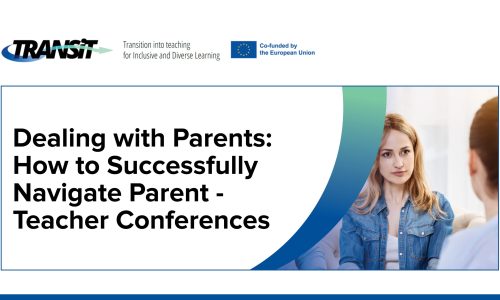

Home–school collaboration comprises important aspects of children’s learning and development and yet, pre-service teachers often feel that they are not sufficiently prepared for this dimension of the teacher profession. This module explores how teachers can navigate difficult conversations with parents and students. Such situations often involve sensitive or emotionally charged topics, such as parental pressure for high academic achievement, student mental health and extended absence from school, difficulties with concentration, or lack of motivation. Rather than offering ready-made solutions, the course invites you to reflect on challenges presented in recorded simulated conversations between teachers, parents, and students.
Many teacher education programs focus primarily on theory, while opportunities to practise complex classroom communication are often limited during school placements. Simulation tools like TeachLivE offer a safe and structured environment where student teachers can rehearse challenging interactions, such as parent–teacher conferences, receive feedback, and develop both their confidence and communication skills through guided reflection. This module uses recorded simulations as a practical bridge between theoretical knowledge and real-world teaching situations.
Central to the module are three recorded simulation sessions, each portraying a different kind of difficult conversation. The recordings are not presented as ideal models, but as authentic, scenario-based examples designed to support observation, discussion, and critical reflection.
To guide your analysis, a selection of texts on parent teacher conferences and on communication techniques for difficult conversations will be recommended.
The module takes approximately 5–8 hours to complete. It includes short readings, video-based analysis, and reflective tasks designed for pre-service and early-career teachers.
This module comprises observation and reflection exercises based on three different video sequences illustrating difficult conversations in parent–teacher interaction.
The conversations have been recorded using TeachLive technology with a person acting as a teacher and another person through avatars acting as the other parties of the conversation.
You will observe the dialogues and reflect on the process and the outcome of the respective meetings. What objectives do the different parties have and what typical roles do they assume? Is there a tangible result of the meeting? What strengths and weaknesses does the teacher demonstrate and to what extent is the meeting successful from the point of view of the educator? What areas of improvement can you identify?
A selection of recommended texts and articles will serve as a basis for your own reflection. For each session and/or article there will be a set of questions to answer, most of which will be automatically graded, whereas some will require free-text answers that will primarily serve as your personal comment and feedback to the course provider but maybe also as suggestions or food for thought for future students.
